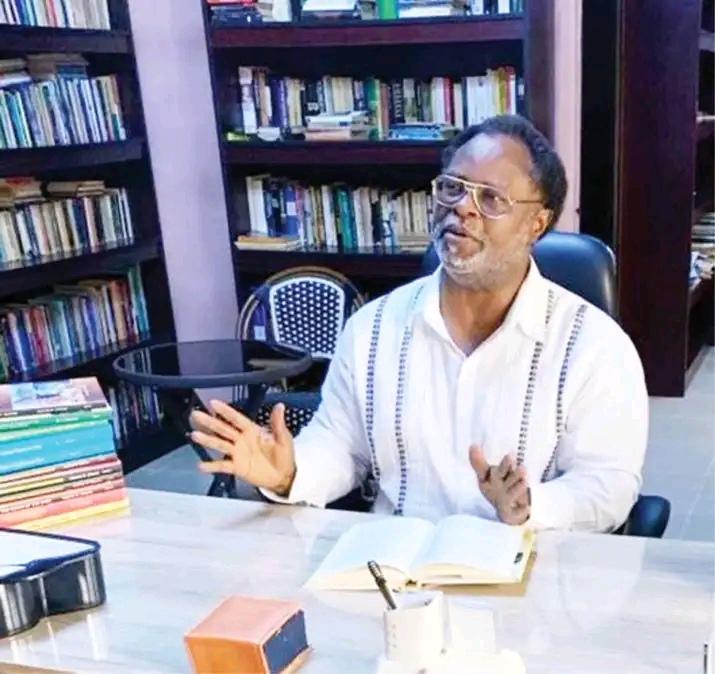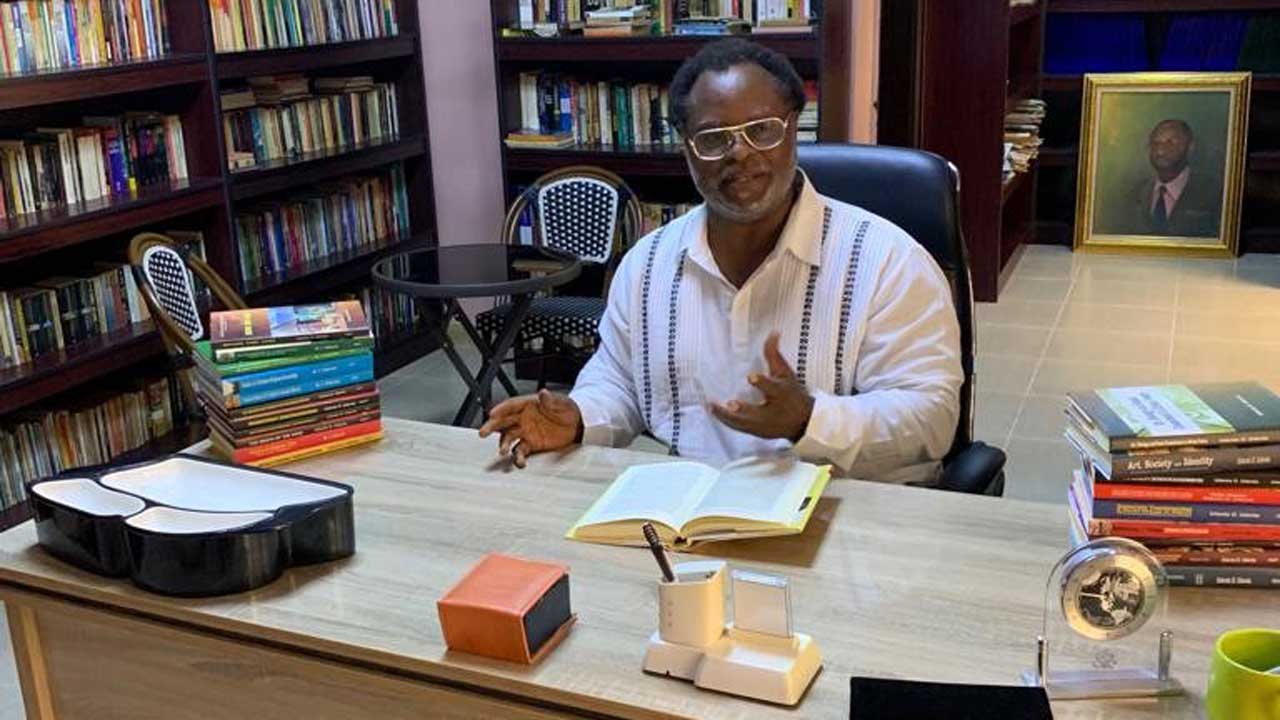By Clem Aguiyi
I met Prof Udenta in books and on television before our paths physically crossed . Since we met our meeting has been fulfilling and intelectually rewarding hence I am penning this tribute.
Professor Udenta O. Udenta is a multifaceted personality who may be seen through a variety of lenses. A single viewpoint is insufficient. I’m tempted to approach the puzzle from the standpoint of a public intellectual. One who bridges the gap between theory and practice, which is the main sign of a true public intellectual.
Operationally speaking, a public intellectual is a well-known, knowledgeable someone whose written works and other social and cultural contributions are appreciated by many people in society at large as well as by academic audiences and readers. Udenta has only been so defined as one who has offered himself to society as a source of critical thinking needed for development and society’s understanding of life generally.
This September, Professor Udenta O. Udenta, who has a double-barreled name for dropping his English in protestation and effort at decolonisation, turns 60. On that day, the entire country will pause to honour him. This is the fourth degree of Recognition in Maslow’s theory of motivation (Hierarchy of Needs), where society rewards the person who has worked so hard to improve it. To honour one of their own who has lived such a sublime life, the academic community, political class, diplomatic community, civil society organisations, and the general public will come together.

A national discussion on How to Make Nigeria Work and a public presentation of Professor Udenta’s 21 books will make up the double-barreled national event. Professor Udenta is distinguished as a political thinker and, more crucially, as an authority on culture and literature by at least three of the 21 books he wrote or edited. These three volumes stand out and have had an international impact.
Age is simply a number, they say. Most people would assume that Professor Udenta O. Udenta should be close to 70 years old by now based on the over three decades he has prowled the national stage and clutched the national limelight. The life of Udenta as an enigma is a study of the influence of political courage, intelligence, and mentoring.
Udenta was taken under the wing of a famous Nigerian writer, publisher, and activist named Arthur Agwuncha Nwankwo of the Fourth Dimension publishing fame because of his prior display of outstanding intelligence as a young Marxist scholar. Udenta learned the ropes and refined his craft as a writer and pro-democracy activist under the tutelege of great Arthur Nwankwo.
Under Arthur, Udenta had rough times with Abacha’s brutal military administration, which pursued him and his principal and imprisoned him a record five times. For a man that cherish free speech and arts , the incacerration was too much to bear. But instead of being cowed , Udenta felt more unafraid after enduring the baptism by fire when he was eventually freed from the last illegal incarceration for doing nothing but talking too much of truth to power.
He and Arthur Nwankwo joined in the formation of the Eastern Mandate Union as pioneers, which worked closely with NADECO to oppose the Abacha dictatorship and the annulment of the June 12 presidential election, which was later revealed to have been won by the late Chief MKO Abiola.
The political organisation – the Eastern Mandate Union – in which Professor Udenta played a significant role, served as the platform for the expression and aggregation of the Southeast’s strategic interest and involvement in political activities of the era. First in coming was the emergence of the five political parties, which Chief Bola Ige dubbed the “Five Fingers of a Leprous Hand.” Later came the legacy political parties that gave rise to the current political system, specifically the Peoples Democratic Party (PDP), and the All Peoples Party (APP) which later became the All Nigerian Peoples Party (ANPP).
Udenta became an easy toast of the political class after being bolstered and still stinging from his terrifying experience at the hands of the Abacha junta. He was just past 30 and was vivacious and full of energy. The Alliance for Democracy (AD), which Udenta joined and became its powerhouse as the national secretary, was a natural choice for him given the party’s ideological undertones of leftism.
His writings, particularly are revolutionary. As a Marxist scholar, philosopher, and theorist, Professor Udenta Udenta is devoted to promoting a better society and improving Nigeria as a country and Africa.
He currently holds a place among the great African writers and activists for African decolonization. Chinua Achebe, Ngugi wa thiongo, Ayi Kwei Armah, Peter Abrahams, Flora Nwapa, Wole Soyinka, Cyprian Ekwensi, Elechi Amadi, and Camara Layeare are just a few of such great African writers.

Professor Udenta’s position in history is now assured, and the momentous occasion of his ascension to the ranks of the elderly as a sexagenarian is marking it. Udenta O. Udenta is the Director of the Centre for Alternative Policy Perspectives and Strategy (CAPPS), Abuja, Nigeria. He has also held positions as a pro-democracy and human rights activist, Senior Research Fellow in the School of Humanities and Centre for Igbo Studies at Abia State University, National Secretary of one of Nigeria’s major political parties (Alliance for Democracy) between 1998 and 2000, and Director with the Institute for Peace, among others.
Due to his incessant detention by the military regime led by the late General Sani Abacha, Professor Udenta O. Udenta was compelled to leave his position as a senior research fellow with the Centre for Igbo Studies and senior lecturer in the School of Humanities at Abia State University Uturu in 1998. He spent more than 20 years hibernating from literature and academia. In 1993, he released Revolutionary Aesthetics and the African Literary Process, which received widespread acclaim and went on to establish one of the ground-breaking canons of African literary studie.
With the publication of 21 books that he either wrote or edited and which were the results of meticulous investigation that had gone unnoticed since 2006, Udenta made an intellectual return. He was in high school between the ages of 13 and 14 when he wrote his six-volume youthful textual compositions of aesthetic, moral, and philosophical contents between 1977 and 1979. Stream 2 of his works includes his scholarly and intellectual works from 1986 to the present.
His books are indeed diverse. His most recent publications, Art, Society and Identity in African Literature, Autonomy of Values and Crisis of Theory in Contemporary Nigerian Literature, are the cherry on top of earlier works like Revolutionary Aesthetics and the African Literary Process and Art, Ideology and Social Commitment in African Poetry from the 1990s are prized collections.
This most recent stream focuses entirely on democracy, peace practice, cultural studies, and his progression from the centre of intellectual conscience to the world of social practice across a straight but occasionally interrupted flow.
Like Nietzsche, Udenta says compositions are works of art because time tries its teeth in vain on them. Udenta holds that great intellectual endeavours transcend the age in which they are created, assuming transcendent character and power even when constrained by the historical, cultural, and ideological environment in which they were created.
Nigerians, your countrymen honour you today, Professor Udenta O. Udenta. You have made iconic contributions to literature, culture, democracy, and the advancement of the country as a great statesman, patriot, and public intellectual. Indeed, you are now among the wise and legendary. And I sincerely hope that this occasion does not signal retirement. No retreat until the office of the citizen you have laboured for is fully established.
Happy 60th birthday, Prof. May God bless your new age…

